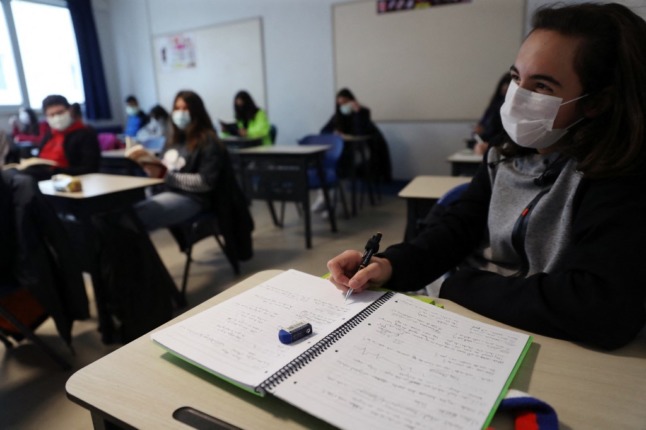Swiss farmers under pressure to harvest crops
The predicted return of heavy rains over the weekend are prompting farmers to collect their crops in a rush, before more precipitations damage their harvest and affect their livelihood.
“If it rains again, the moisture and fungi in the wheat will cause it to be downgraded from bread production to pig feed. So rains can result in a 30 to 40-percent loss of income”, Geneva farmer Hubert Dethurens told RTS broadcaster.
“Therefore, we must save what we can before the next rain”, he added.
Some farmers have not been able to weed out the impurities after last week’s precipitations, and tonnes of crops had to be destroyed.
READ MORE: Heavy thunderstorms to return in Switzerland from Friday
After the holidays, students will be at increased risk of Covid infection
Although so far the risk of catching coronavirus among adolescents has been low, and serious complications from this disease are rare, doctors say the rate of infections will increase in this age group after summer vacations.
“When you start school again, the risk of being infected is probably going to be very high”, according to Pierre-Alex Crisinel, doctor in the pediatric and vaccinology unit of the Vaud Cantonal Hospital (CHUV).
He attributed this spike to the Delta variant, which is highly contagious not only for adults but for adolescents as well.
What this means is that “the probability of escaping the infection when returning to school is declining”.
“This should be an incentive to get vaccinated this summer”, he added.
Switzerland started vaccinating this age group in June.
READ MORE: Switzerland to start Covid vaccinations for 12 to 15-year-olds

A 78-percent chance of contact with an infected person at large events
To be able to take part in mass events in Switzerland, participants must present a Covid certificate showing vaccination, recovery from the disease, or a negative test result.
However, according to the Covid-19 Task Force, infected people take part on average in three out of four major events.
This is because the tests, especially rapid antigen ones, are not 100 percent accurate and some infected people can slip through the cracks.
“Even someone with a low viral load can cause serious outbreaks”, the task force notes.
Health Ministry: West Nile virus could reach Switzerland
As health officials are focused on curbing the Covid pandemic, another virus could soon circulate in Switzerland.
The mosquito-borne West Nile virus, so called because it was isolated for the first time in Uganda, has not yet been detected in Switzerland. But “various species of mosquitoes that act as vectors are present in the country. There is a risk of transmission of the virus in Switzerland “, said the Federal Office of Public Health (FOPH) on its website.
About 75 percent of West Nile infections are harmless. In the rest of the cases, flu-like symptoms accompanied by a high fever, and sometimes reddening of the skin, appear about 14 days after infection. The virus normally clears up without treatment, but sometimes serious complications occur, especially meningitis.
In terms of prevention, FOPH recommends the usual protection against mosquitoes: clothing with long, loose sleeves, mosquito spray, and sleeping under a mosquito net.
A Covid drug purchased by Switzerland not effective against the Delta variant
Antibody treatment used in severe cases of coronavirus has been shown to be ineffective against this fast-spreading and highly contagious variant.
Active substances in Bamlanivimab, manufactured by a US company Eli Lilly, have been found to be effective in a clinical trial against previous variants, but were unable to neutralise Delta.
Switzerland purchased 4,300 doses of this medication in May 2021. “The first treatments will be available from mid-June for certain groups of high-risk patients”, said the Federal Office of Public Health (FOPH).
Christian Garzoni, infectious disease specialist and director of the Moncucco Clinic in Lugano, Ticino, noted that “the government bought what was available. It was the right decision”.
Switzerland “aims at a risk diversification strategy, which is why it is looking for contracts for various promising products” a FOPH spokesperson said.
If you have any questions about life in Switzerland, ideas for articles or news tips for The Local, please get in touch with us at [email protected]



 Please whitelist us to continue reading.
Please whitelist us to continue reading.
Member comments